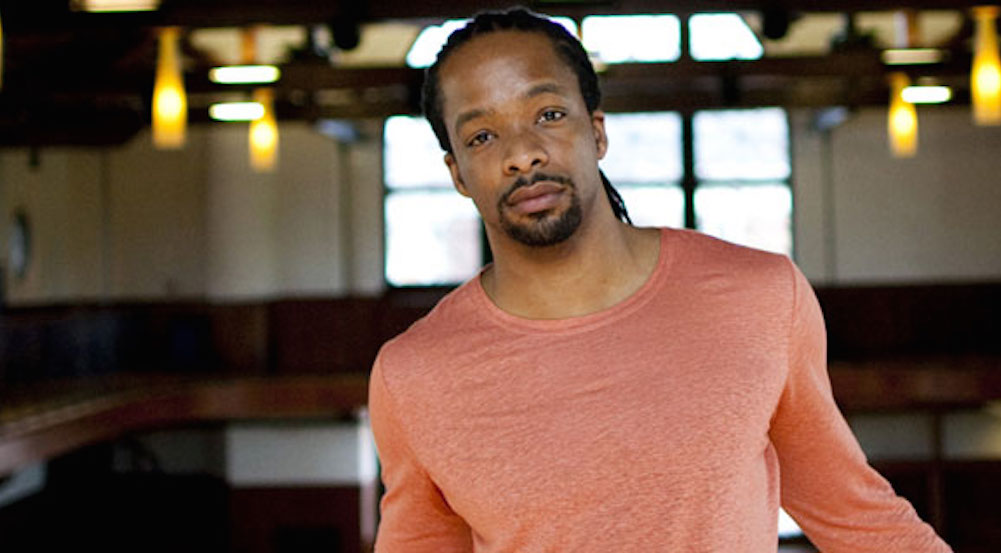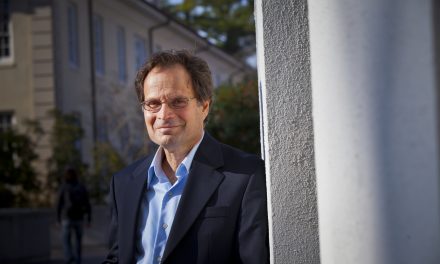
Photo courtesy Emory University
College sophomore Zachary Issenberg remembers the moments when his Intermediate Poetry Workshop professor sang Prince lyrics in class, and when he ran through the quad during a class break to get a King of Pops popsicle.
Issenberg is not the only one showcasing admiration for Jericho Brown, assistant professor of English and creative writing. Earlier this month, Brown was one of five winners of the 80th Anisfield-Wolf Book Awards — an American literary award honoring written works that contribute to larger discussions about racism and diversity — for the latest of his two poetry books, The New Testament. Past awardees include Martin Luther King, Jr., Langston Hughes and Toni Morrison.
“[The New Testament] is about what is means to be a citizen, a brother and a lover in a nation that rejects your citizenship, refuses your brotherhood and denies your love and how you come to terms with calling yourself a citizen of that particular nation, if you know that everything about that nation is set up so that it can thwart you in any and every way it possibly can,” Brown said.
The Louisiana native, who began teaching poetry workshops at Emory in 2012, has not only published his poems in The New Republic and The New Yorker but has won the Whiting Writers Award, the American Book Award and others. Before earning his Ph. D. in literature and creative writing from the University of Houston, Brown was a speechwriter for a former mayor of New Orleans.
The general acclaim for The New Testament, which touches on racism, blackness, sexuality, nationhood and citizenship with the use of biblical language, is part of a moment in which our culture is more ready to face the truth that the book’s poetry brings, Brown said.
“I think people have been afraid of poetry in the past, because it makes the complexities of life and realities of life and the truths of life all the more clear,” he said. “Over and over again, our country and our culture are told not to deal with those things as they are.”
Brown, who said he draws inspiration from “old-school music,” like Stevie Wonder and Michael Jackson, characterized much of poetry, including his own, as works that take “all of history and bring it down to the scale of one.”
He said he hopes that, while vulnerable in the face of the real conditions that his poems illuminate, readers discard the “hallmark” version of themselves that is “only informed by tradition” and take action.
“When I was a young person, poems were so important to me,” he said. “They sustained me. They helped to keep me alive. My hope is that, whether or not I am ever aware of it, that my poems can do that for other people.”
While he said he wished that he could say that awards do not matter and that he does not care, Brown said he was filled with gratitude upon hearing about his recent award.
“[It] feels like I might have done something right in this life, and it feels like I might be living up to my potential, that I might be actually taking on my purpose and doing what I am supposed to be doing on this planet.” Brown said. “I feel love. It feels like magic.”
According to an April 2 University press release, poet Rita Dove, one of the jurors for the Anisfield-Wolf Book Award, said Brown’s poetry was “a reminder that outrage is a seductive disease — we would rather rage or weep than find a way to love in spite of the pain.”
“Brown’s poems brim with love for this damaged world without letting the world off the hook,” Dove said.
College senior Dana Sokolowski, Brown’s honors thesis advisee in poetry, said Brown is truly devoted to helping her, sometimes spending two hours with her on the phone to workshop a poem.
“He’s my biggest inspiration,” she said. “His voice is power — it doesn’t apologize, it provokes — his lines are taut but melodic.”
She recalled the times when she could predict his answer: “get your life together, honey,” as he tossed his hair over his shoulder with his usual sass. But sometimes, Sokolowski is caught off-guard with Brown’s difficult questions or sincere compliments.
Issenberg agreed, describing how Brown sat with him nearly every single week for one-on-one meetings about his work.
“His care for poetry shows,” he said. “With students, [Brown] cares about their personal idea of poetry and how they get to it.”
College senior Benjamin Sinvany, who took Brown’s introductory poetry class, said he appreciates Brown as a mentor and friend who says what is on his mind.
“He has an aura and approachability about him that makes interaction possible and enjoyable,” the history major and environmental science minor said. “He is just another soul trying to get his words out there.”
— By Karishma Mehrotra
2015-2016 Executive Editor Karishma Mehrotra is a College senior and has been interested in journalism since her freshman year in high school. Her major is journalism and international studies with an unofficial minor in African studies. She became a writer for the news section of the Wheel when she began college and became news editor that year. She has interned at CNN, The Wall Street Journal, the Boston Globe, USA Today, the Atlanta Journal-Constitution, Palo Alto Weekly and KCBS Radio. She studied abroad in Ghana last semester, which inspired her to join the African dance group on campus, Zuri. She recently worked as a tutor at the Writing Center. She is also a Dean’s scholar.






